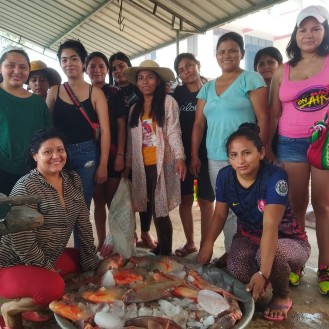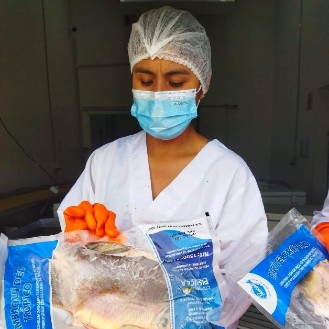Bolivian women’s aquaculture success no fish tale

Learn more about RRU’s business programs.
Peces para la Vida a women’s empowerment and aquaculture development project based in Bolivia, is growing beyond its initial phase of economic self-sufficiency opportunities for local women to include economic self-determination options for its most successful fish producers.
The project, which receives funding from Global Affairs Canada, provides training for Bolivian women to enter the aquaculture farming sector by raising pacu fish. The indigenous species is cared for in large rain-filled ponds and sold to local markets and restaurants. While some program participants are in the start-up phase of learning aquaculture skills, other producers have grown their operations to upwards of 25 ponds and are expanding to other aspects of sector – producing fish feed or fish stock.
Sean Irwin, an associate professor at the School of Business who has been involved in the project for the past decade, is excited to see the burgeoning industry find success.
“When we talk about food systems, you can't just say, ‘oh, the farmers need to increase productivity’ because getting food from conception to consumption is much more than just farmers.
"That’s a very critical piece of it, but there’s also marketing, regulations, food processing, creating new supply chains to diversify how people make money and things like that. You have to take a systems approach.”
In practical terms, this means offering a variety of training programs beyond fish farming.
“One of the components of our training has been the diversification of how to eat fish. An instructor, Vincente, who is a Red Seal chef from Argentina, teaches different dishes people can make. This helps fish consumption continue to rise as new ways of eating it are discovered by consumers.”

In addition to culinary techniques, the classes teach entrepreneurial skills so that participants (75% of whom are women) wishing to enter Bolivia’s growing restaurant sector have the business skills to support their enterprise.
Women’s leadership in the aquaculture sector is also evident with the formation of APNI – an all-female member food producers group – currently building an industrial feed production plant to supply farmers with pacu feed. This foray into large-scale corporate activity sparks another new learning curve for the women.
“How do you create a board of directors? How do you ensure accountability? How do you manage the ownership of shares in the organization?” Irwin says as examples of skills women leaders acquire in class. “You have to have those kinds of systems thought out. We emphasize that you've got to do corporate level thinking of the liabilities and the risk assessments.”
The next phase of growth would draw a direct line from producer to table.
“We're really trying to create supply lines to cities. The popularity of the fish in cities is growing so there's more restaurants and that's where not only more consumers are, but more wealthier consumers,” says Irwin.
 This expansion requires another addition to the developing food system: cold chains. In rural locations fish can quickly get to markets and restaurants but transporting them longer distances requires refrigeration.
This expansion requires another addition to the developing food system: cold chains. In rural locations fish can quickly get to markets and restaurants but transporting them longer distances requires refrigeration.
“We would like to see new business emerge with transporters to have a cold chain that, as a farmer, you can sell to that person. They will put it in their truck. The truck transports it appropriately to a restaurant that they have connections within Santa Cruz or Cochabamba or wherever.”
In building a successful food system, this group of women are realizing economic benefits at every stage from farm to plate. And that’s no fish tale.
Irwin received an Early in Career Award for his work on this project from the Confederation of University of Faculty Associations of British Columbia.
Peces para la Vida works with several partner organizations including Bolivian partners IMG and CEPAC and World Fisheries Trust from Canada.